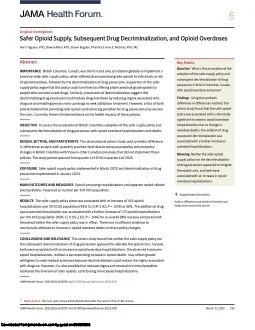By Hai V. Nguyen, Shweta Mital, Shawn Bugden, Pharm; et al
Importance British Columbia, Canada, was the first and only jurisdiction globally to implement a province-wide safer supply policy, which offered pharmaceutical grade opioids to individuals at risk of opioid overdose, followed by the decriminalization of drug possession. Supporters of the safer supply policy argue that this policy could save lives by offering pharmaceutical-grade opioids to people who use toxic street drugs. Similarly, proponents of decriminalization suggest that decriminalizing drug possession could reduce drug overdoses by reducing stigma associated with drug use and enabling persons who use drugs to seek addictions treatment. However, critics of both policies believe that providing safer opioids and removing penalties for drug possession may worsen the crisis. Currently, there is limited evidence on the health impacts of these policies.
Objective To assess the association of British Columbia’s adoption of the safer supply policy and subsequent decriminalization of drug possession with opioid overdose hospitalizations and deaths.
Design, Setting, and Participants This observational cohort study used synthetic difference-in-differences analysis with quarterly province-level data to compare prepolicy and postpolicy changes in British Columbia with those in other Canadian provinces that did not implement these policies. The study period spanned from quarter 1 of 2016 to quarter 4 of 2023.
Exposure Safer opioid supply policy implemented in March 2020 and decriminalization of drug possession implemented in January 2023.
Main Outcomes and Measures Opioid-poisoning hospitalizations and apparent opioid-related toxicity deaths, measured as number per 100 000 population.
Results The safer supply policy alone was associated with an increase of 1.66 opioid hospitalizations per 100 000 population (95% CI, 0.41-2.92; P = .009) or 33%. The addition of drug possession decriminalization was associated with a further increase of 1.27 opioid hospitalizations per 100 000 population (95% CI, 0.05-2.50; P = .046) for an overall 58% increase compared with the period before the safer supply policy was in effect. There was insufficient evidence to conclusively attribute an increase in opioid overdose deaths to these policy changes.
Conclusions and Relevance This cohort study found that neither the safer supply policy nor the subsequent decriminalization of drug possession appeared to alleviate the opioid crisis. Instead, both were associated with an increase in opioid overdose hospitalizations. The observed increase in opioid hospitalizations, without a corresponding increase in opioid deaths, may reflect greater willingness to seek medical assistance because decriminalization could reduce the stigma associated with drug use. However, it is also possible that reduced stigma and removal of criminal penalties facilitated the diversion of safer opioids, contributing to increased hospitalizations.











